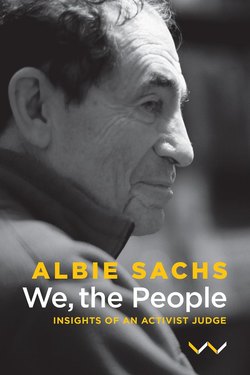Читать книгу We, the People - Albie Sachs - Страница 22
На сайте Литреса книга снята с продажи.
ОглавлениеWhy I Supported Amnesty
‘HONOURING THE TRUTH IN POST-APARTHEID SOUTH AFRICA’ | NORTH CAROLINA JOURNAL OF INTERNATIONAL LAW AND COMMERCIAL REGULATION | VOLUME 26, NUMBER 3, SUMMER | 2001
Today, we are still building our nation. Some of us are still learning that a nation is characterised by the diversity of its people. People who speak different languages and are from different cultures, still share certain basic understandings. If we allow bitter division and opposition to continue, even in terms of memories of the past, our future will be based on separation and mistrust.
To me, the biggest gain of our Truth and Reconciliation Commission created by law in the first year of our new democracy was the extent to which it exposed apartheid’s so-called ‘separate development’ as having been something beyond institutionalised racism. The bitterly cruel methods used to sustain it, the lies told, and the misinformation and the deceit involved – all that has come out. It has changed the moral balance in our country and made other kinds of transformations possible. To me, that is the most significant gain. The Truth Commission itself did not create, restore, or established a balance of fairness and trust. Instead, it facilitated these processes. Unless the ideals of the Truth Commission are confirmed in reality by the South African people, so that whites are not living in relative affluence while blacks overwhelmingly are living in poverty, then the full story of the Truth Commission will never be complete. Still, the Commission was part and parcel of a much wider public process that, at the very least, created a moral climate in which it was easier to give social and economic transformation a chance to take place. The Truth Commission was not just an agency that recorded our history, but a landmark chapter in our history.
What are the international implications of South Africa’s Truth Commission? Not every country can secure justice by these means. For example, I completely supported the prosecution of General Augusto Pinochet in Chile. There were differences of principle. First, General Pinochet gave himself and his regime amnesty. In South Africa, the main representatives of the oppressed people themselves negotiated and agreed to it. Secondly, General Pinochet never acknowledged the criminality of what had happened – the murders and assassinations. It is that total refusal to bend the knee which created such a profound sense of rancour, a sense of arrogant perpetuation of the denial of the cruelty. In South Africa, the Truth Commission was based upon the acknowledgement that terrible things had happened. Third, the amnesty given in Chile was a blanket one covering all actions perpetrated during a certain period. To receive amnesty in South Africa, each perpetrator had to come forward one by one to tell his or her story. This process put a face on the cruelty. In South Africa, the perpetrators acknowledged their crimes, and shame is/was their punishment.
It is not easy to go home to your children in the evening, who have seen your testimony on television about the bodies that you buried and the lies that you told.
Shame, however, gradually dissipates as one reintegrates into society. In Chile, the perpetrators have been shielded from their lies and their shame. These differences indicate that one cannot adopt a categorical position with respect to international criminal courts or truth commissions. Without the threat of prosecution in South Africa, no one would have come forward to the Commission. A simple calculation was made: ‘I might be prosecuted. I might go to jail. I am given this opportunity’.
At the end of the day, we learned information that we would never have known otherwise, information that would have remained behind a wall of total silence.
I believe that the international community should support the International Criminal Court. I would like to see all the nations of the world, the United States included, place themselves within its jurisdiction. At the same time, truth commissions (and there have been over twenty) have a considerable role to play alongside, and sometimes instead of, ordinary prosecution.
There are many circumstances where prosecution is impossible because history has moved on and there is no one left to prosecute. But in these situations, storytelling is still necessary and acknowledgment is still vital. It enables people to feel they are in the same country, not two, three, four, or five separate countries bounded by separate memories.
